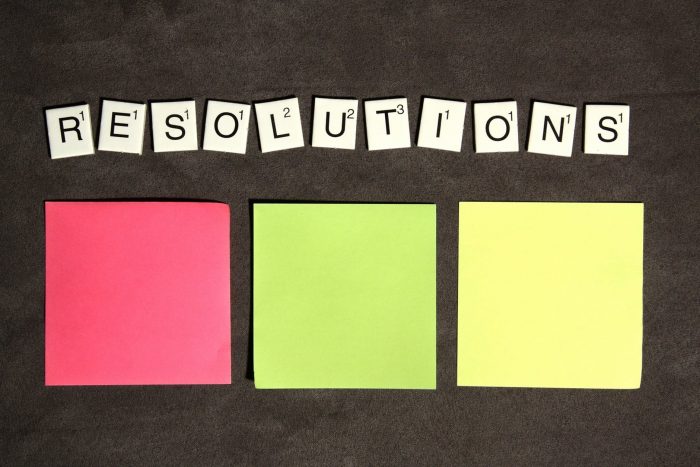I won’t ask you to raise your hand if you’ve ever made a New Year’s resolution. I doubt there would be many hands in this virtual room. How many of you kept 100% of your resolutions? No cheating now….
Before you beat yourself up, I have good news. It’s not your fault- mostly. Making “traditional” New Year’s resolutions really doesn’t work.
First, some context. Why do we make resolutions in the first place? The ancient Babylonians, Romans and early Christians all made resolutions in hopes that good conduct would ensure a more prosperous year. Today, we don’t exactly expect our losing those 10 pounds to appease the gods, although we do look toward a better year by stopping or changing bad habits.
Research shows that about 50 percent of us make New Year’s resolutions in any given year, yet less than 10 percent of us dreamers actually keep those promises for more than a few months.
The lack of stickiness to our resolutions comes from the way our brains work. We are all two-sided: left brain, focused on logic and order, and right brain, filled with emotion and imagination. Together, they make a powerful partnership that energizes to fulfill our life plans. The problem with resolutions is that they mostly come from the left brain. As Mr. Spock from Star Trek might say, “That is entirely logical.” And, that’s the problem. It’s all logical.
Dictionaries define a resolution as, “a position arrived at after some consideration.” The decision to lose weight (the most common New Year’s resolution), or to start exercising or to stop some unhealthy habit make sense to live healthier lives. Reducing our spending or saving more will provide better financial security. Learning a new skill or changing jobs can further your career. These outcomes are all logical. The problem is we don’t fuel our actions through just logic and reason.
Nobel Prize winning psychologist Daniel Kahneman’s research in modern economic theory proved that humans make decisions emotionally first, rationally second. It is the intuition, imagination and emotion of the right brain that mainly fuels our behaviors.
It makes sense – just consider a few of the recent decisions you may have made.
That new car? Yes, the one that has that is a hybrid, gets the best mileage and earns top consumer ratings does get concentrated consideration. But look at that model with the sporty aluminum wheels and turboed engine that bellows from zero to 60 in less than four seconds. There’s our baby!
Looking for that economical home. Good luck in these times. You could stay in this small apartment and delay the purchase until a more sensible economic era. That’s logical. But what about more space, a better neighborhood and gardening room? Overtaxed budget and financial stress be darned- we’re moving now!
When you needed to trade in your old cell phone. Sure, this one has a better warranty and longer battery life, but that one is red! My favorite color!
See? Emotions 1, logic zilch. (I still have my red phone by the way).
What does this all have to do with the ethics of our New Year’s resolutions?
Well, if we consider a resolution a promise to ourselves, while we may break that promise we’re probably not hurting many others. So, the ethics in the breaking are more about our conscience than the quality of others lives.
Still, a promise to ourselves can be extremely important, even life changing.
We need a new strategy to set up goals for ourselves that not only inspire us, but also set us up for success.
How do we do this? Let’s change our approach so that we’re bringing both sides of our brains to the table in making and fulfilling our self-promises. Seems the most ethical action, if not the healthiest thing to do, right?
Instead of resolutions – decisions from our left brain – let’s make New Year’s AFFIRMATIONS – statements that assert the truth and fuel our emotions.
Here are some simple examples:
Resolution: “I will lose 10 pounds this year by cutting back and eating right.” (Sound familiar?)
Affirmation: “I will be in my best health this year. I believe in myself and no matter what, I’m going to be proud of my accomplishment to eat well. Day by day.”
Resolution: “I’m going to exercise 40 minutes every day.”
Affirmation: “When I feel good, I’m happy. So, this year, I’m going to do physical activities that fill me with joy. Walking through my favorite park, running or biking with some great music or a friend. I will match my physical activities with emotional fuel too.”
Resolution: “I am going to save 10 percent of my income this year.”
Affirmation: “There is so much abundance in the world. By setting aside some of my income, I’m going to fulfill my dreams of independence and choice.”
Try it yourself. Write out your New Year’s resolutions the old way, then rewrite them as affirmations – statements that inspire you, that build joy, that cause you to smile just by reading them. If you don’t feel emotion when re-writing them, do it again. Write them out as many times as it takes until you get that “aha” feeling inside. You’ll feel right while you’re doing right.
A counselor told me once that you know your inner emotions are stirred when you find yourself taking a big deep breath. I can attest to this because I pay attention for it now.
Here’s to an ethical New Years of great affirmations and a lot of deep breaths!












Read 0 comments and reply